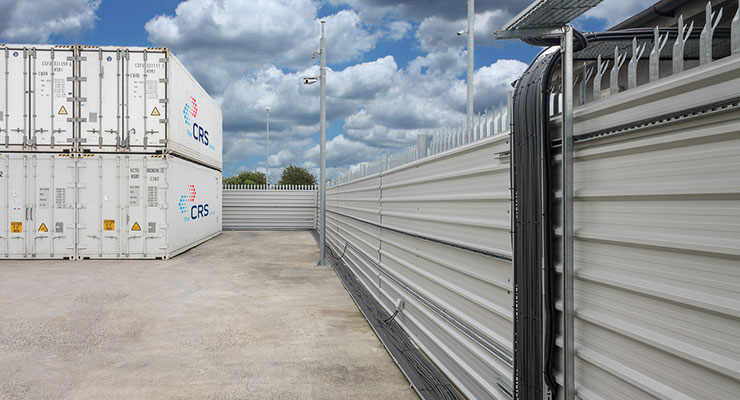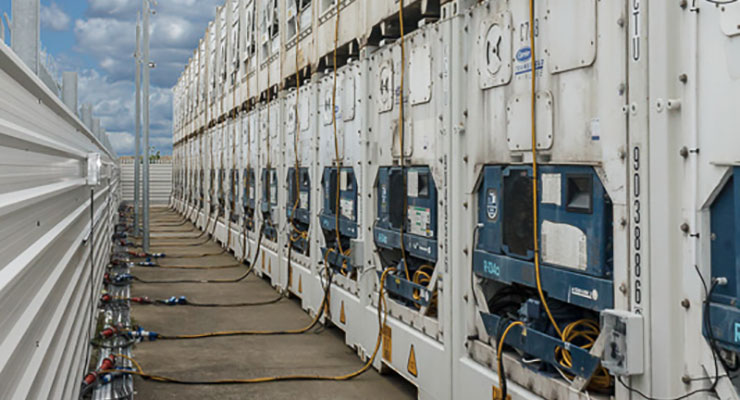Are you ready to make your first commercial refrigeration purchase? Perhaps you’re simply after some early stage advice? Whatever your needs, the CRS refrigeration guide will take you through some of the cold store basics. From storage best practices to simple care tips, we’re here to help you make the most of your refrigerated containers.
This refrigeration guide is designed to answer the biggest questions you’re likely to have about commercial refrigeration before you decide to rent or buy.
What is the difference between domestic and commercial refrigeration?
The basics of how a fridge works are fairly simple. A compressor or electric pump moves liquid around the fridges cooling bars to chill the interior. When the fridge is opened and the cool air is replaced with warm air, the process repeats.
Whilst this system is enough to keep domestic fridges chilled to a safe temperature, in commercial situations, the humble domestic fridge will not stand up to the heavy duty use. Using domestic fridges in commercial situations not only poses a health and safety risk, it’s also not cost effective, as units are likely to break down more regularly.
Commercial fridges are designed for hotter temperatures and more heavy duty use. They are far better insulated, use fans to evenly distribute cool air around the unit and have state of the art temperature monitoring equipment, ensuring temperatures stay at a safe level whilst in use.

What are the advantages of using commercial refrigeration?
Commercial refrigeration units are designed to be used day in, day out without falling victim to the changes in temperature that can affect the quality and safety of food. They are built specifically with businesses in mind and therefore, offer a number of advantages over other types of storage.
- Cleanliness – Most refrigerated containers are made with non-slip stainless steel interiors, making them safe and easy to clean.
- Advanced tech – Many units comes with digital temperature monitoring that can be easily accessed and recorded if this is needed for inspection.
- Capacity – Cold storage units offer businesses as much or as little space as needed with a range of unit sizes available.
- Time – Due to the fan assisted mechanics of commercial units, produce is cooled to the desired temperature much faster than a standard domestic unit.
- Convenience – Most refrigeration units are fully portable and require no planning permission, making them perfect for distributors and businesses looking to expand.
Who can benefit from commercial refrigeration?
The number of industries that can benefit from using commercial refrigeration is vast. Whilst some businesses rely on cold storage for their entire strategy, other company’s may benefit from making the switch to commercial refrigeration, or expanding their current cold storage capabilities.
Catering – Large and small units for schools, hospitals and catering companies.
Retail – Portable refrigerated containers to help prolong the life of goods before they reach the customer.
Dairy – Temperature controlled units for milk, cheese, yoghurt and other dairy products.
Bakery – Units for the storage of uncooked and ready-to-eat baked goods.
Fish – Cold storage for fisheries, seafood distributors and other businesses specialising in fresh or frozen fish.
Meat – Meat rail cold rooms, portable refrigeration containers and mini cold stores for all types of meat produce.
Pharmaceuticals – Digital temperature controlled refrigeration for vaccines, test kits, blood samples and more.
Botanicals – Miniature and standard cold storage for flowers, plants and other botanical products.
How should I store food in a commercial refrigeration unit?
Storing goods correctly will not only prolong their life but ensure they are safe, hygienic and free from contamination. Below are some simple but effective ways to correctly store goods in refrigerated units.

First in, first out
When packing and unpacking produce, you should always follow the first to go in, first to come out rule. Doing this ensures that goods nearest to their use-by are distributed and sold first, avoiding costly and unnecessary food waste and minimising the risk of unit contamination.

Over stacking and over packing
Refrigerated containers work by evenly distributing air around the unit, helping to maintain a cool and stable temperature. Packing goods too tightly or too close together can restrict the amount of cool air reaching each individual product, slowing down the cooling process significantly.
Furthermore, packing goods above the unit’s capacity can cause a severe drop in temperature, leaving produce unsafe or unfit for consumption.

Protective packaging
To keep your refrigerated unit clean and your produce safe, be sure to always use protective packaging that is well sealed and free from tears or other types of damage. Packaging should be fresh, hygienic and should never be reused under any circumstances.
How do I take care of commercial refrigeration units?
Taking care of your refrigerated container will not only prolong its life but improve the health and safety of the unit, as well as protecting your employees from harmful bacteria.
Following these simple steps, you can keep your units in tip top condition all year round.
- Clean up any leaks or spillages as soon as they happen to prevent bad odours and bacteria developing.
- Immediately dispose of any products that have experienced cross contamination.
- Thoroughly clean door seals at least once a week and check carefully for dirt and grime.
- Ensure employees follow standard safety and hygiene rules when working with cold storage units.
- Check unit temperature once or twice a month and note these results down in a log book.
- Avoid obstructing the unit’s fans, as this will hinder its ability to cool.
- Only store up to or below the pallet capacity stated. Overstocking will reduce temperature and thus effectiveness of the unit.
Follow these basic health and safety care tips for a refrigerated unit that’s both hygienic and safe to use.
Like our refrigeration guide? Find out more about our commercial refrigeration containers and cold store units here or give the CRS team a call on 0800 085 2298 today.














